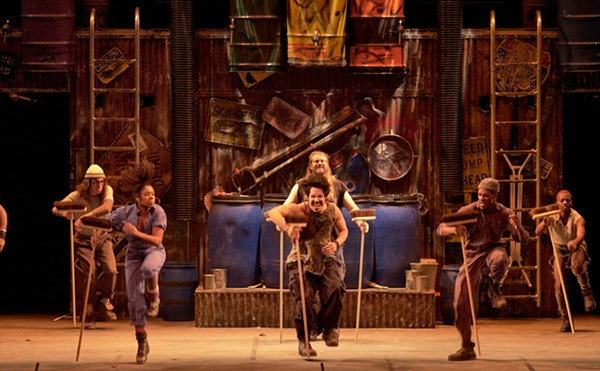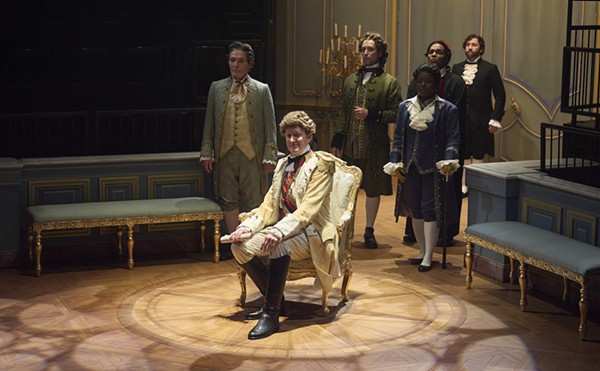Making his way into the pantheon is August Wilson, who is rapidly becoming the great primeval storyteller. He chronicles the black experience and, in the manner of an American Homer, transforms it into a universal epic. His plays are like tales recounted around an ancient campfire. He is incapable of writing small works. Even when taking place in the recent past or confined to a backyard, recording studio, or boardinghouse, there is something intoxicatingly expansive about his dramas.
Jitney, his first play, which is being performed at Karamu Theatre, is set in a car service garage in the '70s. Even in this primitive, early work there is a spellbinding poetry and sweep that recalls long, hard roads of suffering and migration. Whether a struggling young welfare mother accusing her boyfriend of stealing her precious grocery money, a driver transporting a lost drunk home, or the tough old roosters that populate the garage talking about their dangerous compulsion to stake out a woman, the playwright gives haunting voice to the souls of the American dispossessed.
Wilson is in the midst of a quest worthy of Don Quixote by creating a play for each decade of the twentieth century, chronicling the journey of ex-slaves out of the South into an industrialized North, the conflict of an African voodoo past with Christian spirituality, the intoxication of jazz, the havoc of drugs--all in search of an identity that balances a tortured past and leads to an ultimate ecumenical melding. All this would be ideological hooey if Wilson didn't have the grand language and passion to support his vision; indeed, Wilson is the stage's most evocative poet since the death of Tennessee Williams. His works are an oasis in a desert of prosaic playwrights, allowing performers to walk tightropes over exotic symbolism, volatile explosions of passion and longing.
Jitney was written before Wilson began this epic voyage. It only shows traces of the operatic emoting and supernatural underpinnings that would spark his later works.
There is the expected Wilson emotional fortress: a ramshackle garage populated by a group of frayed workingmen who are angling for prestige, women, and a gentle life in the suburbs. Outside, the encroaching face of urban renewal threatens to choke off their livelihood.
The playwright aptly dramatizes the quirks that proximity creates in co-workers. There is a nutty quarrel over the physical charms of Lena Horne as opposed to Sarah Vaughan. A debate over lending four bucks can become an earth-shattering matter; ogling someone's woman can lead to gunplay; a drunken customer blowing dollar bills around the garage becomes a comic routine suitable for an old-time burlesque show.
By throwing together such varied oddball individuals, Wilson creates a web of emotional relationships--tender, funny, sexy, and teeming with life and vitality. There is the benign patriarch dispatcher Becker (L. Arrington Bey), the troublemaking tattletale (played as an irrepressible tub of gravel by James Seward), the hungry Vietnam vet Youngblood (a deeply felt performance by Eric Myricks), the self-deceptive alcoholic (Butch Terry), and the angry prodigal son released from prison (Stephen Acy).
Each character has a distinct relationship with the outside world. Only when the garage is threatened do they pull together and become a unit. However, since this is a first play, the tone wavers between sitcom and powder keg.
Set designer Richard Morris Jr.'s caramel-colored garage, with its atmospheric grease stains, tires, and street lamps, gives the evening a dead-on verisimilitude. Director Caroline Jackson-Smith strikes a match under her performers, making them burn with an unrelenting intensity. If there is a lack, it is in a tendency not to vary pitch; it's all played on the highest decibel level. Inevitably, Wilson's red-hot storytelling knack, even at the beginning of his career, propels this dramatic spear--doused in Karamu's high-octane intensity--straight to its target, proclaiming the entrance of a playwriting monarch.
Jitney, through February 21 at Karamu Theatre, 2355 E. 89th St., 216-795-7070 ext. 226.











